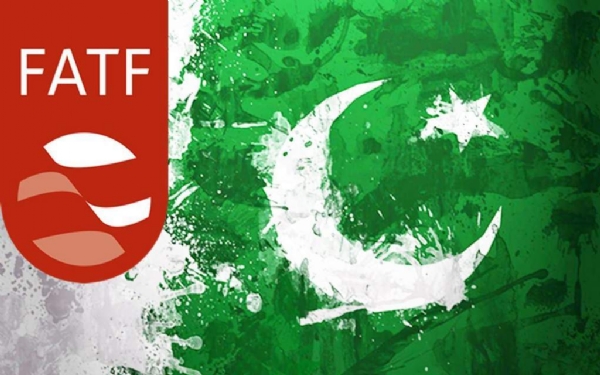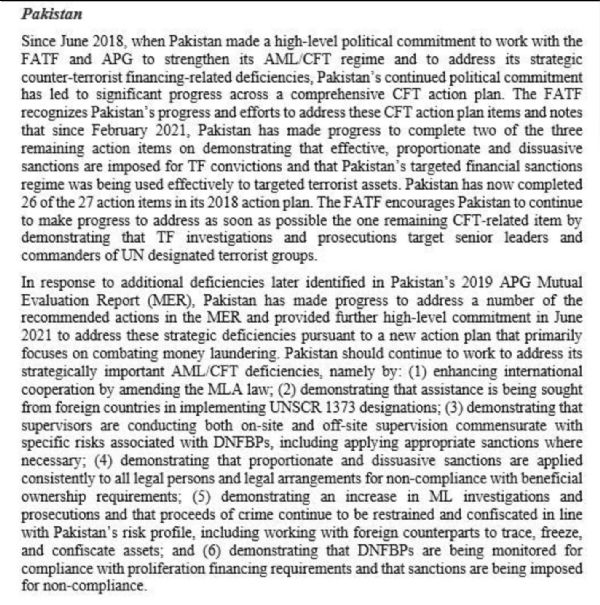Big setback for Imran Khan as Pakistan remains on FATF's grey list, will deepen Islamabad's economic crisis
26 Jun 2021 10:44:04
New Delhi, June 26: Major blow to Imran Khan-led Pakistan government who was expecting that Financial Action Task Force may remove the country from its grey list this year, as turning down the Islamabad's hope the watchdog retained Pakistan in its “grey list”.
The global terror financing watchdog decided to keep Pakistan on the grey list as it gets failed to adequately investigate and prosecute senior leaders and commanders of UN-designated terrorist groups, including Lashkar-e-Taiba LeT founder Hafiz Saeed and Jaish-e-Mohammed founder Masood Azhar. It also asked Pakistan to work to address its strategically important deficiencies.

"Pakistan remains under increasing monitoring. It has largely addressed 26 out of 27 items on the action plan," Marcus Pleyer, President, FATF, said. The decision was announced after the multilateral watchdog’s five-day virtual plenary meeting under the German presidency of Marcus Pleyer.
"The FATF encourages Pakistan to continue to make progress to address as soon as possible the one remaining Combating the Financing of Terrorism (CFT)-related item by demonstrating that Terror Financing (TF) investigations and prosecutions target senior leaders and commanders of UN-designated terrorist groups," an FATF statement said.
In the document, FATF said Pakistan should continue addressing “strategically important” deficiencies in its anti-money laundering and counter-terrorist financing regimes by enhancing international cooperation by amending the country’s mutual legal assistance (MLA) law and demonstrating that assistance is being sought from foreign countries in implementing designations under UN Security Council resolution 1373.
Pakistan should also demonstrate that “supervisors are conducting both on-site and off-site supervision commensurate with specific risks associated with DNFBPs (designated non-financial businesses and professions), including by applying appropriate sanctions where necessary” and that “proportionate and dissuasive sanctions are applied consistently to all legal persons and legal arrangements for non-compliance with beneficial ownership requirements”, the watchdog said.

Further, FATF said Pakistan must also demonstrate an increase in money laundering investigations and prosecutions, and that proceeds of crime continue to be restrained and confiscated in line with the country’s risk profile, including working with foreign counterparts to trace, freeze and confiscate assets, and that DNFBPs are being monitored for “compliance with proliferation financing requirements and that sanctions are being imposed for non-compliance”.
It should be noted that FATF has put Pakistan under its scanner since June 2018 for terror financing and money laundering risks, after an assessment of its financial system and law enforcement mechanisms. It is now 3 years since Islamabad has been on the anti-terror financing body's grey list.
It seems like Pakistan's last bid to play the victim card over a suspicious terrorist attack at terrorist-in-chief Hafiz Saeed's residence in Lahore has not hurled the watchdog.
This decision will surely hit hard Pakistan as the latest development will make it more difficult for Pakistan to get financial aid from the International Monetary Fund (IMF), World Bank, Asian Development Bank (ADB), and the European Union (EU). As per the reports by the Pakistan government, this is causing damage of around $10 billion annually to the country.
Surprisingly, the watchdog made the announcement a day after India's National Security Advisor (NSA) Ajit Doval has pitched for an "action plan" against Pakistan-based terror groups Lashkar-e-Taiba and Jaish-e-Mohammed under the framework of eight-nation grouping SCO and called for expeditiously bringing the perpetrators of terror attacks to justice.
In February this year, the FATF gave a fourth extension to Pakistan to fully implement a 27-point action plan and "strongly urged" it to meet the remaining three conditions about terror financing investigations and the United Nations Security Council resolutions.
.
.